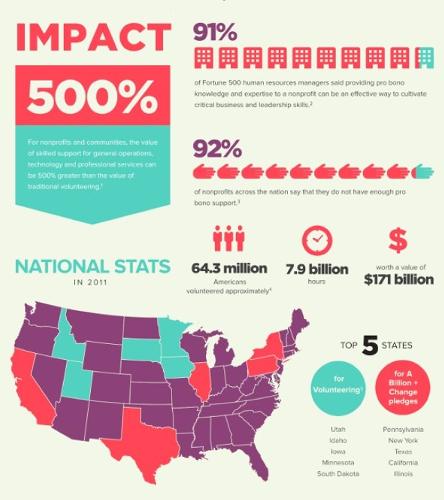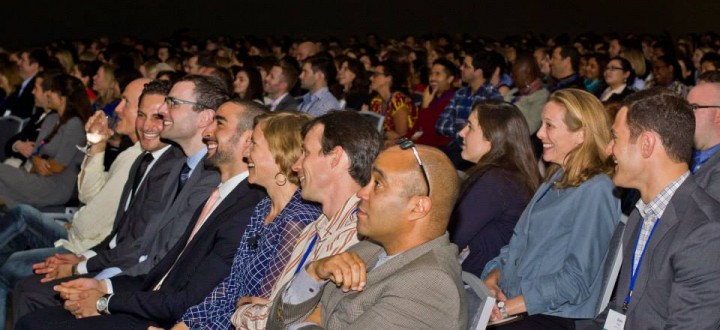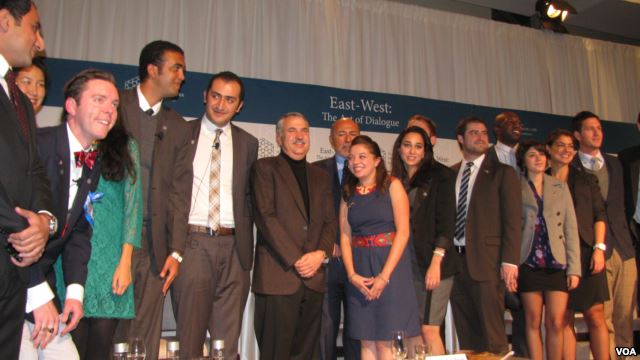WASHINGTON, DC | November 11, 2013 - This week on BIZ+SOCIAL, we bring you the best from the New Global Citizen, Fast Company, Devex Impact, and more.
GLOBAL PRO BONO
Visualizing The Benefits Of Skills-Based Volunteering
 In the past few years, employees have begun to demand more social responsibility from their employers. At the same time, consumers care about buying from do-gooder brands more than they ever have before. So it shouldn’t be too surprising to learn that half of all companies surveyed in the Committee Encouraging Corporate Philanthropy’s 2013 “Giving in Numbers” report now offer pro-bono programs, according to the Case Foundation. A Billion + Change, a campaign founded by activists and philanthropists that aims to increase pro-bono service pledges from companies, has been a key part of growing corporate skills-based service programs throughout the U.S. The Case Foundation and A Billion + Change recently released this infographic to highlight the impacts of the campaign. More than 500 companies have joined in, offering up a whopping $2 billion worth of pro-bono and skills-based services. Some sectors are clearly getting more love than others: Education is by far the most popular priority for companies, while homelessness and disaster relief rank towards the bottom. Presumably those disaster relief numbers go up if a disaster hits near a company’s headquarters. Read More…
In the past few years, employees have begun to demand more social responsibility from their employers. At the same time, consumers care about buying from do-gooder brands more than they ever have before. So it shouldn’t be too surprising to learn that half of all companies surveyed in the Committee Encouraging Corporate Philanthropy’s 2013 “Giving in Numbers” report now offer pro-bono programs, according to the Case Foundation. A Billion + Change, a campaign founded by activists and philanthropists that aims to increase pro-bono service pledges from companies, has been a key part of growing corporate skills-based service programs throughout the U.S. The Case Foundation and A Billion + Change recently released this infographic to highlight the impacts of the campaign. More than 500 companies have joined in, offering up a whopping $2 billion worth of pro-bono and skills-based services. Some sectors are clearly getting more love than others: Education is by far the most popular priority for companies, while homelessness and disaster relief rank towards the bottom. Presumably those disaster relief numbers go up if a disaster hits near a company’s headquarters. Read More…
IMPACT & INNOVATION
Corporate, NGO Leaders Believe In The Promise of Partnerships
Corporate and NGO leaders may not always share the same perspectives or points of view, but there seems to be a consensus around the importance of partnerships in achieving development goals.“You can’t really do it alone anymore,” said Scott Jackson, CEO of Global Compact. “The days of nonprofits doing small projects are gone because there is an opportunity to be scalable and to have impact on a much larger basis, but only if they partner.” Devex Impact interviewed Jackson and other key stakeholders and executives from NGOs and corporations about the challenges and benefits of partnerships during the 2013 Clinton Global Initiative annual meeting.Brian Harris, Western Union’s chief product officer, offered the advice that it’s crucial for partners to spend time getting to know one another in person so they can better understand how the others work on a day-to-day basis. Deirdre White, president and CEO of Pyxera Global, said partnerships are truly complex.“NGOs, government and the private sector don’t always work all that well together and we still have a long learning curve in terms of understanding how we can better align our goals and really work in lock-step towards something that delivers value to society and value to business,” she said. Read More…
LEADERSHIP
Net Impact Lays the Foundation for Collaborative and Constructive Global Transformation Through Business
 As an Egyptian-American, my friends and family were surprised when I did not enthusiastically celebrate the revolution in Egypt three years ago. My answer was (and still is) simple: I prefer renaissance over revolution. While change through innovation may be slower and more subtle, it tends to be less painful than the fallout of sudden upheaval—disruptive change often leaves no roadmap for the future. Solution-centered innovation can be more impactful and long-lasting. It is this belief that brings me to the annual Net Impact Conference year after year. MBAs from around the world come to Net Impact to hear from global leaders committed to harnessing the power of business for social good. Driven by the belief that we all have the ability to spark change, leaders from the private, public, and social sectors convene at Net Impact to discuss, learn, and collaborate towards a better future. As the Net Impact Conference has grown, its focus has significantly expanded to include a wider global scope. The road to change becomes even more complicated when individuals and institutions begin to seek ways to address challenges in emerging and frontier markets. I was curious to see if the conference would acknowledge the need for careful and thoughtful engagement when addressing complex global challenges. As I often tell ourMBAs Without Borders Advisors, good intentions are not necessarily solutions. Read More…
As an Egyptian-American, my friends and family were surprised when I did not enthusiastically celebrate the revolution in Egypt three years ago. My answer was (and still is) simple: I prefer renaissance over revolution. While change through innovation may be slower and more subtle, it tends to be less painful than the fallout of sudden upheaval—disruptive change often leaves no roadmap for the future. Solution-centered innovation can be more impactful and long-lasting. It is this belief that brings me to the annual Net Impact Conference year after year. MBAs from around the world come to Net Impact to hear from global leaders committed to harnessing the power of business for social good. Driven by the belief that we all have the ability to spark change, leaders from the private, public, and social sectors convene at Net Impact to discuss, learn, and collaborate towards a better future. As the Net Impact Conference has grown, its focus has significantly expanded to include a wider global scope. The road to change becomes even more complicated when individuals and institutions begin to seek ways to address challenges in emerging and frontier markets. I was curious to see if the conference would acknowledge the need for careful and thoughtful engagement when addressing complex global challenges. As I often tell ourMBAs Without Borders Advisors, good intentions are not necessarily solutions. Read More…
CITIZEN DIPLOMACY
Egyptian-American Citizen Diplomacy Promotes Understanding
 In an era of increasing globalization and reliance on impersonal electronic communication, more and more people develop their most lasting impressions through face-to-face encounters. In this context, citizens’ diplomacy becomes a powerful force in bridging cross-cultural differences. With that in mind, Egyptian businessman Shafik Gabr recently launched a new citizens’ diplomacy effort to build bridges between the Arab world and the West. Gabr’s initiative, “East-West: The Art of Dialogue”,sponsored exchanges between 20 young and emerging leaders in the arts, sciences, law, media and business from Egypt and the United States. The Egyptian and American young professionals began the citizens’ diplomacy program in Egypt last June. They met with public figures and engaged in intensive discussions, debates and site visits. The program then moved to the United States, including a visit to Washington last week where the fellows met with Obama administration officials, members of Congress, policy experts and business leaders. The Gabr Fellows examine the mutual challenges and opportunities that the two very different countries share, including economic issues, entrepreneurship, and the role of religion in public life. Read more…
In an era of increasing globalization and reliance on impersonal electronic communication, more and more people develop their most lasting impressions through face-to-face encounters. In this context, citizens’ diplomacy becomes a powerful force in bridging cross-cultural differences. With that in mind, Egyptian businessman Shafik Gabr recently launched a new citizens’ diplomacy effort to build bridges between the Arab world and the West. Gabr’s initiative, “East-West: The Art of Dialogue”,sponsored exchanges between 20 young and emerging leaders in the arts, sciences, law, media and business from Egypt and the United States. The Egyptian and American young professionals began the citizens’ diplomacy program in Egypt last June. They met with public figures and engaged in intensive discussions, debates and site visits. The program then moved to the United States, including a visit to Washington last week where the fellows met with Obama administration officials, members of Congress, policy experts and business leaders. The Gabr Fellows examine the mutual challenges and opportunities that the two very different countries share, including economic issues, entrepreneurship, and the role of religion in public life. Read more…
ENTERPRISE DEVELOPMENT
Eight Keys to Ending Poverty
 The remedy we propose is to tap the mainstream capital markets to fund large-scale, global enterprises that address the basic needs of these 2.7 billion people: needs for clean water, renewable energy, affordable housing, accessible health care and education, and, above all, jobs. The Business Solution to Poverty will spell out exactly how big global businesses launched either by independent entrepreneurs or by existing multinational corporations can earn profits large enough to attract substantial amounts of capital by satisfying these needs — and lifting millions into the middle class in the process. Each of these businesses, we believe, must set a 10-year goal of building a customer base of at least 100 million, achieving revenues of $10 billion or more per year, and realizing sufficient profitability to attract both indigenous and international commercial investors while minimizing its environmental impact to the greatest extent possible. The approach we advocate to end poverty doesn’t follow a simple formula. You can’t write it all down on a prescription pad. However, it is systematic. We call it zero-based design. To understand what we mean by this term, consider the analogy we’ve based it on: zero-based budgeting. Read More…
The remedy we propose is to tap the mainstream capital markets to fund large-scale, global enterprises that address the basic needs of these 2.7 billion people: needs for clean water, renewable energy, affordable housing, accessible health care and education, and, above all, jobs. The Business Solution to Poverty will spell out exactly how big global businesses launched either by independent entrepreneurs or by existing multinational corporations can earn profits large enough to attract substantial amounts of capital by satisfying these needs — and lifting millions into the middle class in the process. Each of these businesses, we believe, must set a 10-year goal of building a customer base of at least 100 million, achieving revenues of $10 billion or more per year, and realizing sufficient profitability to attract both indigenous and international commercial investors while minimizing its environmental impact to the greatest extent possible. The approach we advocate to end poverty doesn’t follow a simple formula. You can’t write it all down on a prescription pad. However, it is systematic. We call it zero-based design. To understand what we mean by this term, consider the analogy we’ve based it on: zero-based budgeting. Read More…
MORE
PYXERA Global’s CEO Deirdre White Discusses Purposeful Global Engagement
Workplace Giving Programs Make ‘Doing Good’ into ‘Doing Good Business’
The Importance of Social Networks – Worldwide Efforts to land an IBM ICS Sales Position
Ten Types of Innovation: The Discipline of Building Breakthroughs
Reinvention Comes Through Collaboration
New Global Citizen
New Global Citizen is an online magazine that chronicles the stories, strategies, and impact of innovative leadership and international engagement around the world. The magazine captures the ground-level impact of these approaches, providing an avenue through which beneficiaries and implementers alike can showcase their effects. In so doing, the New Global Citizen elevates the way in which individuals, corporations, and others are championing a better future for our world.




